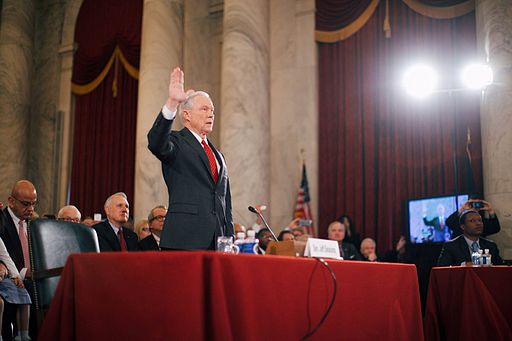
March 2, 2017; WBUR
Jeff Sessions, the United States Attorney General, has recused himself from the investigations into Russian involvement in the Trump campaign. Congressional representatives from both sides of the political aisle, including Rep. Jason Chaffetz (R-UT), chair of the House Oversight Committee, called for recusal this week after it became clear that Sessions had met with Russian officials during the campaign.
Sessions initially claimed that he had not met with any Russian officials during the campaign. During his press conference on Thursday afternoon, Sessions admitted that he had met with Russian ambassador Sergey Kislyak, but that he could not remember what they had discussed. “We listened to the ambassador and what his concerns might be,” he said. “I started off by saying—I don’t remember a lot of it, but I do remember saying I’d gone to Russia with a church group in 1991.” He described Kislyak as an “old-style Soviet type.” He insisted that they had not discussed the Trump campaign, describing ambassadors as “gossipy” and portraying the meeting as between friends. (Never mind that a lawyer ought to have a good memory of potentially compromising conversations, especially with people as high-profile as the Russian ambassador.)
The campaign is being investigated for ties to the Russian government, following the resignation of General Michael Flynn over allegations that he discussed U.S. sanctions with Kislyak. Additional evidence has surfaced that indicates President Trump and his campaign have ties to the Russian government that could compromise U.S. interests and security.
Sessions said that he had asked his staff for their “candid and honest opinion” about whether he should conduct the investigation, and that he was following their recommendation of recusal “because I was involved in the campaign.” Acknowledging that the turmoil over Russian involvement has been ongoing for several weeks and that a decision had been expected for days, he responded, “I wish I’d had more of my staff on board, but we’re still waiting for confirmation for them.”
“This recusal should not be interpreted as confirmation of the existence of any investigation, or suggestive of the scope of any such investigation,” he added.
Congressional Democrats have said that recusal is not enough and Sessions should resign as Attorney General because he perjured himself during his confirmation hearing. The entire Massachusetts Congressional delegation has joined the call for Sessions’ removal. Congressman Joe Kennedy III (D-MA) said in a statement,
An Attorney General who refuses to defend LGBTQ students from discrimination and to uphold our sacred promise of access to the ballot box is unfit for the office. But last night’s reports of Russian contacts followed by misleading statements to the public demand Jeff Sessions’ immediate resignation. There must be an independent investigation into the entire Trump campaign’s Russian involvement and zero tolerance for cabinet officials and senior aides who provide false information to the American people.
Sign up for our free newsletters
Subscribe to NPQ's newsletters to have our top stories delivered directly to your inbox.
By signing up, you agree to our privacy policy and terms of use, and to receive messages from NPQ and our partners.
Senator Chuck Schumer (D-NY) added, “Because the Department of Justice should be above reproach, for the good of the country, Attorney General Sessions should resign.”
Sessions argued that the question he was asked during his confirmation hearing was about “a continuing exchange of information during the campaign between Trump surrogates and intermediaries for the Russian government [that] is totally false.”
Actually, Senator Al Franken (D-MN) asked if there was “any evidence that anyone affiliated with the Trump campaign communicated with the Russian government in the course of this campaign.” Senator Patrick Leahy (D-VT) asked if he “had been in contact with anyone connected to any party of the Russian government about the 2016 election, either before or after Election Day.”
Sessions replied during the hearing, “I didn’t have—did not have communications with the Russians, and I’m unable to comment on it.” He maintained in his press conference on Thursday that he “did not have any meetings with any Russian operatives or intermediaries about the Trump campaign…My reply to the question of Senator Franken was honest and correct as I understood it at the time.”
Sessions’ confirmation was controversial even before the meetings with Kislyak were known. His voting record as a senator from Alabama is downright terrifying to centrists and liberals, nonprofits, and civil rights advocates: An A+ rating from the NRA (including “no” votes on assault weapons bans and increased background checks); a zero-percent rating from NARAL, including banning cloning and stem cell research and banning HHS funding for organizations that provide abortion; a seven-percent rating from the NAACP, including a “no” vote on expanding hate crimes to include sexual orientation and “yes” on voter ID requirements; a “no” on reauthorizing the Violence Against Women Act, “no” on all the post-recession stimulus, and dozens of other votes that clearly represent an extreme right-wing view. It even turns out that some of his former aides are now lobbyists for private prison groups.
It was during Sessions’ confirmation that the now-famous “Nevertheless, She Persisted” incident happened, when Senator Elizabeth Warren (D-MA) was banished from the floor by Senator Mitch McConnell (R-KY) while attempting to read a letter from Coretta Scott King in which King expressed concerns about Sessions’ racist views disqualifying him for a judgeship.
Sessions’ claim that his recusal is simply a result of his being “involved” in the campaign, as if it were a technicality, as if this were a normal situation, is misleading. His candidacy as attorney general, which was tightly contested to begin with, is now unsustainable and a threat to American interests.—Erin Rubin













